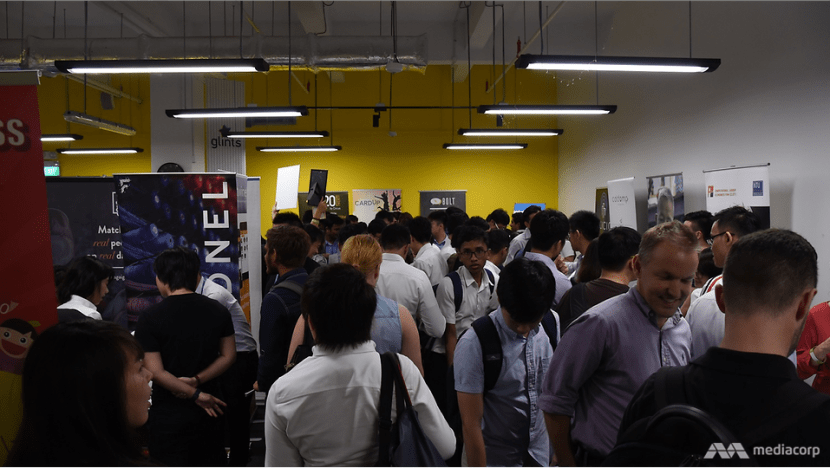commentary Commentary
Commentary: Fresh grads should see short-term contracts, internships as stepping stones
For those looking for job security, short-term contracts and internships may seem like a last resort. If approached with the right mindset though, such opportunities could have substantial benefits, says PeopleSearch’s Jaime Lim.

Fresh graduates have had a rocky start in their job search with the COVID-19 pandemic dragging the Singapore economy into its worst-ever recession. (Illustration: Rafa Estrada)
SINGAPORE: While you’re still in school, landing a short-term internship is often cause for celebration. However, after graduation, expectations naturally change.
For many in search of job security, anything short of a full-time permanent position is not good enough.
Still, with COVID-19 impacting the economy and tightening the job market, it might be time to look at short-term employment and post-graduate internships through fresh eyes.
According to the Joint Autonomous Universities Graduate Employment Survey released in February, while more graduates were employed within six months after their final exams last year than in 2019, the number in full-time permanent jobs dropped markedly from 81.7 per cent in 2019 to 69.8 per cent last year.
More than a fifth held part-time or temporary jobs. This is more than triple the proportion in 2019.
The continuing uncertainty in the business environment is making companies adopt a cautious hiring approach, developing a hybrid model of full-time employees and skilled contract professionals amid a growing need for specialist talent in fields such as IT and digital marketing.
Their contingent workforce could comprise not just temporary contract workers, but also freelancers, independent professionals, independent contractors or consultants. This way, companies can be flexible in responding to dynamic demands while keeping their fixed personnel costs low.
PRIORITISE LEARNING AND EXPERIENCE
From a worker’s vantage point, while temporary jobs offer less job security, they should not be seen as time-wasting endeavours.
In fact, they represent vital opportunities to learn skills and cultivate experience which fresh graduates clearly lack.
A year in a company that enables you to learn on the job and from more experienced colleagues is valuable not only as far as it allows you to pick up and hone hard and soft skills, but also because the experience can be showcased in your resume to help you land your next job more easily.
READ: Commentary: Fresh grads with no full-time work experience need unconventional methods to land a job
READ: Commentary: My imposter syndrome was a weakness, until I turned it into my strength
A graduate I met recently remarked that with a year’s experience, he qualified for a much larger pool of jobs in his industry where employers often ask for up to three years of experience.
He felt more confident about his abilities. Hiring managers he reached out to were more enthusiastic about interviewing him once they realised he had some practical work experience as opposed to none.
For those unsure about their interests and planned career trajectory, short-term contracts and internships are opportunities to try out a job and employer without having to commit to a long-term relationship with longer notice periods.
Such experiences are a useful way of discovering your strengths, weaknesses, likes and dislikes when it comes to work and a career. This self-awareness should lead to more informed career choices in the future in terms of job functions and industry.
ONE THING COULD LEAD TO ANOTHER
It’s not uncommon for contract jobs and post-graduate internships to lead to permanent full-time employment.

Workforce Singapore said that as of April, over 680 out of about 9,200 graduates who had joined the SGUnited Traineeships Programme had been offered full-time conversions with their host organisations or had found full-time employment elsewhere.
Just as you try out an employer, they get to try you out. A contract worker who shines will naturally increase their chances of being offered a chance to stay with the company at the end of their contract.
From our experience, up to 40 per cent of candidates on short-term contracts end up being offered contract extensions or permanent roles, whether within the same company or elsewhere.
However, fresh graduates need to be strategic when deciding which companies to work for. After all, from the data shared above, most don’t see their shorter-term contracts translate to longer-term employment.
READ: Commentary: Why some workers in Singapore can’t wait to return to the office
READ: Commentary: Why annual leave seems less restful without travel and what to do about it
So, fresh graduates should research the company’s medium to long-term business goals and figure out whether their role is crucial to achieving these.
For instance, for a contract data analyst role, find out through conversations with people in the industry, current and former employees of the company, as well as news reports, whether the company intends to increase its use of big data to make strategic business decisions.
Find out how large the current team is and how many more people will be needed in the coming months and years to meet business goals. How experienced do new hires on the team need to be?
The answers to these questions will help you discern if long-term employment is a possibility. Don’t hesitate to ask the hiring manager outright what the possibility of conversion is. If you feel comfortable with the answer, trying out the job could be beneficial.
In order to increase your chances of being offered something more long-term or permanent, you must do your part. Be curious and interested in learning and excelling. Find out what the company values and add value accordingly. This will put you on the radar of key decision-makers.
WIDEN YOUR DEFINITION OF A DESIRABLE EMPLOYER
If short-term contract offers are all you’re getting lately, consider which types of companies will add the most value to your growth.
While multinational companies and big brands could help burnish your resume, I’d advise not to discount start-ups as they have fewer resources and are therefore more willing to take a chance on fresh graduates who don’t demand large salaries.

Their smaller set-ups also mean that fresh graduates are likely to be assigned crucial tasks and as a result, get richer professional experiences.
Remember that even temporary stints offer opportunities to grow your network as colleagues can become friends and mentors who can open doors to help you get your next job.
Since COVID-19, I’ve also met several individuals including mid-career professionals who are opting for ad-hoc project work mainly out of a desire for flexible hours, varied work and diversifying their risks of being laid-off.
A portfolio career comprising projects with several companies gives graduates varied experience and widens their networks further.
FREE LABOUR?
While short-term contracts, project work and internships can be better alternatives to unemployment, what about unpaid internships?
As with everything, the positives must outweigh the negatives.

Does the job offer abundant learning and networking opportunities? Is it a role that allows you to gain a skill or experience that cannot be found elsewhere? Is it with an employer that adds value to your resume?
From our experience, most companies typically pay interns, but if a company says it won’t pay, find out why by speaking to people in the industry, former or current employees who might be able to explain, as well as read what people are saying about it on career platforms such as Glassdoor.
READ: Commentary: Employees can help identify COVID-19 zombie firms
If the company really doesn't have funds, is transparent about it and offers opportunities that you feel outweigh the lack of remuneration in the short-term, there’s really no harm in dipping your toe into the arrangement.
Employers also have to play their part. Those who don't pay interns risk developing a reputation for being exploitative. In addition to simply being the right thing to do, treating such workers fairly ensures companies will have continued access to quality flexible talent.
Fresh graduates must seize opportunities to widen their definition of gainful employment. Twiddling your thumbs or sending out your resume with a focus only on full-time permanent opportunities may not be entirely wise at this time.
Instead, focus on starting somewhere with a view to readying yourself for better opportunities down the line.
Jaime Lim is Group Business Leader of PeopleSearch, an executive search and outplacement services firm with a presence in six cities including Singapore.















